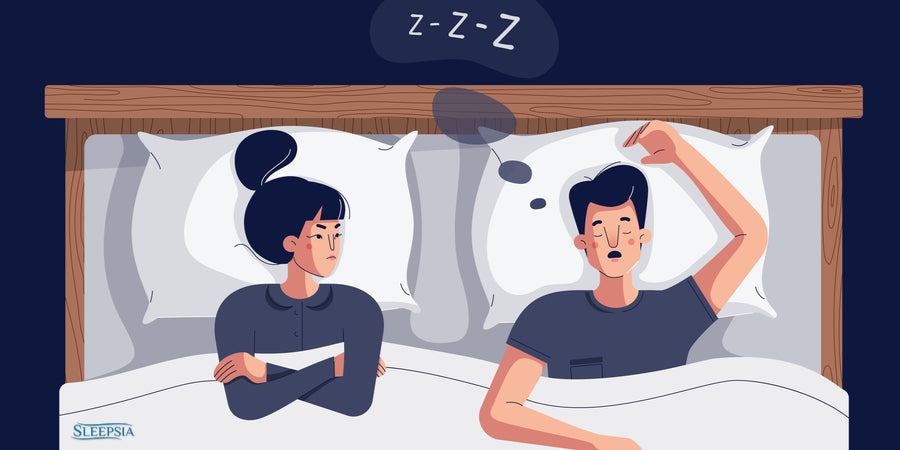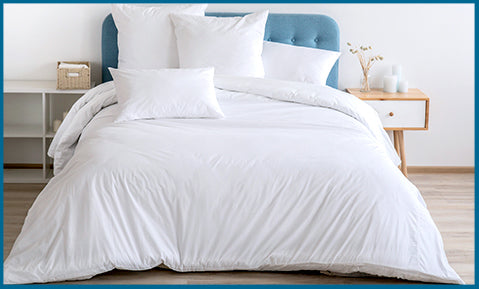
Snoring occurs because of vibrations or blockage in the upper airway. The breath becomes noisy while people sleep. Even though snoring is mostly benign, sometimes it may signify an underlying health condition, such as obstructive sleep apnea (OSA).
However, in most cases home remedies are enough to reduce snoring, but if they don’t work, then you must consult a doctor.
In this article, you'll learn more about snoring and its causes, management, and treatment options.
Snoring Causes
In the United States, snoring affects an estimated 57 percent of men and 40 percent of women.
The following factors increase your risk of snoring:
- Smoking or drinking alcohol
- Muscle relaxants
- Sleeping on your back
- Being middle-aged
- Allergy or cold
- Being male
- Genetics (structure of mouth and throat)
Although most common during middle age, snoring can occur at any point of time. It may last for a long time or disappear automatically upon changing your sleeping position and making healthy lifestyle choices.
According to research, people who snore are at a higher risk of:
- Low levels of HDL (Good) cholesterol
- Obesity
- Stress
And all of these factors increase your risk of developing cardiovascular diseases. However, experts are still debating the relation between snoring and these factors.
Sleep Apnea
Snoring is a common symptom of sleep apnea, which can increase the risk of developing serious medical conditions. People suffering from this condition often wake up gasping for breath.
Types of sleep apnea include:
- Obstructive sleep apnea: results from blockage of the upper airway, causing loud snoring.
- Central sleep apnea: results from problems in the central nervous system. The brain fails to send signals to muscles to breathe.
Snoring is associated with obstructive sleep apnea, and not with central sleep apnea. People suffering from obstructive sleep apnea may experience the following symptoms:
- Snoring (most common)
- Excessive daytime sleepiness
- Headaches
- Insomnia (difficulty in falling and staying asleep)
- Low libido (sex drive)
- Irritability or anxiety
- Difficulty in focusing
- Decreased ability to remember things
Obstructive sleep apnea is linked with:
- Hypothyroidism
- Congestive heart failure
- Nervous system disorders
- High blood pressure (hypertension)
- Acromegaly
Manage Snoring
Home remedies for snoring can help you to alleviate and even treat the symptoms altogether. Here are tips to reduce snoring:
Avoiding Alcohol and Sedatives
Because alcohol and sedatives can relax your throat muscles, which can slide back and block your upper airway, you should avoid them, especially before going to bed.
Also, rely on sleep supplements or medications only after consulting your doctor.
Change Sleep Position
Sleeping on the back exacerbates snoring. It enables the tongue to slide back into the throat and block your airway. So sleep on your side if you snore.
To ensure that you never sleep on your back, you can use a soft object and tuck it behind your shirt. Whenever you sleep on your back, you’ll feel uncomfortable and automatically change your sleeping position.
To sleep on your side, follow the tips provided below:
- Use a pillow with the following properties:
- Loft: 5”-7”
- Firmness: medium-firm to firm
- Place a pillow between your knees to prevent your upper leg from sliding down to the mattress.
- Use a soft pillow cover - one made of silk or bamboo rayon fabric - to reduce friction against your face.
If you can’t find an appropriate pillow size, then try an adjustable pillow that enables you to alter the loft and firmness of the pillow.
Decrease your Weight
Obesity is linked to both snoring and sleep apnea.
High amounts of fat deposit can narrow your airway, leaving little space for air to pass unobstructed.
By simply bringing your weight down and getting to a more moderate weight depending on your height, you can reduce or eliminate snoring altogether.
To reduce weight fast, you can try HITT workouts, which increase your heart rate and force your body to burn more fat for energy.
Here are a few HIIT workout recommendations:
Ideally, you should start with the one for beginners. Upon the improvement of your stamina, you can increase the time or shift to a more intense workout.
More important than exercise is your diet. If you consume more calories than you burn, then you’ll simply gain more weight. You need to be in a caloric deficit in order to lose weight.
Remove Nasal Congestion
Inflammation can cause nasal congestion. Use can rely on the following to alleviate congestion in your nasal cavity:
- Room humidifier
- Nasal strips
- Moisturizing nasal sprays
- Antihistamines
- Corticosteroids
Take medications only after consulting your healthcare provider.
Quit Smoking
Smoking tobacco can irritate the tissue in the airway, leading to inflammation, which narrows the passage and obstructs airflow. A little inflammation is enough to narrow down your upper airway.
So smoking can be a cause for snoring.
By quitting smoking, you can lower the risk of narrowed down upper airway and of several other health conditions.
As smoking is addictive, it can take time to break the habit. To quit, you can follow the START plan:
- S = Set a quit date: You need to choose a date on which you’ll quit smoking. If you don’t, you’ll lose motivation and forget about your resolution.
- T = Tell people around you: Tell people, including your co-workers, family members, and friends, about your resolution to quit smoking
- A = anticipate challenges and prepare a counter plan: When trying to quit, you’ll face frequent challenges because of nicotine withdrawal symptoms. It’s better to be mentally prepared for these challenges.
- R = remove tobacco products: Don’t keep tobacco products anywhere around you. Simply throw out the ones that you have in your house or car.
- T - Talk to a professional: You don’t have to struggle without professional help. Seek help from a doctor, who can help you deal with your withdrawal symptoms.
Practice Good Sleep Hygiene
Good sleep hygiene is essential, especially if you suffer from obstructive sleep apnea. According to experts, sleep deprivation can lead to an increase in weight, which exacerbates snoring.
To fall asleep fast and wake up well rested, you can follow the steps provided below:
- Get comfortable bed material: purchase pillows and mattresses that are comfortable and supportive.
- Avoid screens: keep your electronic devices away before heading to bed. Devices emit blue light, which signals to the brain that it’s daytime, hindering the release of melatonin, the sleep hormone.
- Avoid caffeine and alcohol: caffeine stays in your system for a long time and can prevent you from falling asleep.
- Keep the room cool and quiet: lower the temperature of your bedroom and use earplugs or white noise machines to get rid of noise from your surroundings.
- Don’t exercise close to bedtime: don’t exercise too close to bedtime. Exercise increases your alertness, so it should be generally avoided at least 2-3 hours before going to bed.
- Relax your mind: After you dim your mind, don’t simply let thoughts run wild in your mind. These thoughts have the ability to increase anxiety and wake you up. Instead, relax your mind with various breathing techniques.
Exercise your Throat
Several throat exercises can be used to strengthen the throat muscles so that it won’t slide down into your airway.
According to research, throat exercises can prevent snoring. Here are a few exercise recommendations that you can try on your own:
- Throughout the day repeat the five vowels (a, e, i, o, u) for at least 2 minutes.
- Open your mouth and tighten the back of your throat for 30 seconds, then release. Repeat for several times.
- Push your tongue on the roof or bottom of your mouth for 30 seconds, then relax. Repeat for several times.
- Shift saw to one side for 30 seconds then to the other side. Repeat for several times.
Throat exercises may help you if the problem isn’t blockage because of enlarged tissues.
Pillow for Snoring
You can use pillows meant for people suffering from obstructive sleep apnea. These pillows are designed specifically to help people deal with snoring.
Anti-snore pillows are especially made to improve head and neck alignment so that the airway is constantly open. Some of these pillows even prevent you from sleeping on your back and promote side sleeping.
Wedge pillows raise your head enough to prevent your tongue from sliding back into your throat. While normal pillows can do this too, wedge pillows made with memory foam should be preferred, as they provide better support to your shoulders and back.
If you use a CPAP machine, then purchase a pillow that contains extra space for the machine.
Snoring and Relationship Difficulties
Let’s be clear here. Snoring can substantially damage your relationship. Snoring may interrupt not only your sleep but also your partner’s.
To avoid difficulties in your relationship, follow the tips provided below:
- Partner can try earplugs to block the noise
- Use a white noise machine to drown out the noise
- Partner can wake up the snorer to stop the snoring
- Snorer should sleep facing away from his or her partner
A snorer can get medical devices or a surgery if the snoring is too loud. And to
Snoring Treatment
Treatment for snoring can improve your quality of life. Treatment options range from dental appliances to invasive surgeries.
Several anti-snoring devices are available on the market. These anti-snoring devices work by either providing airflow or adjusting your jaw.
You should discuss these treatment options with your healthcare provider.
Continuous Positive Airway Pressure (CPAP) Machine
For obstructive sleep apnea, doctors most commonly prescribe the CPAP machine, which uses a specialized mask to deliver pressurized air in order to keep your airways open while you sleep.
This eliminates snoring and helps you to enjoy an uninterrupted night of sleep.
As the most commonly used anti-snoring device, CPAP is effective and well tolerated by most people.
Dental Appliances
Dental devices are custom made to hold the jaw in a certain position so that the area for airway is maximized. These devices are custom made according to the shape of a person’s face.
Although these devices are helpful, they may cause jaw pain. But for many, they are effective and can mute snoring.
Surgery
If CPAP and dental devices fail to provide relief, then your doctor may recommend a surgery. Results from surfers aren’t as predictable as from a CPAP machine.
But in extreme cases, surgery may be required. Surgeries may include:
- Uvulopalatopharyngoplasty (UPPP): extra tissue from the uvula is removed to increase space for airflow.
- Palatal implants: to deal with loose tissue, fiber rods are implanted into the palate.
- Radiofrequency: Tissues in and around the throat and tongue are stiffened using radiofrequency.
- Genioglossus advancement: the external tongue muscle, which forms the majority of the tongue, is moved forward to increase space for airflow.
- Septoplasty: a surgical procedure to straighten the bone and cartilage between the two nostrils.
Surgery can mute snoring, but may result in other complications. So consult your doctor and enquire about the risks of all the provided options.
When to see a doctor?
Generally, snoring isn’t a major health condition. But in some cases, it can interfere with your life. It can often disrupt your and your partner’s sleep.
Sleep deprivation can have serious health risks including depression, anxiety, irritability. It can seriously impact the quality of your life.
So it’s better to see a doctor when sleep apnea starts to interfere with your life.
To help find out more about your snoring, the doctor may conduct a sleep study. This is a simple test in which you have to sleep at a sleep laboratory.
While you sleep, machines record your vitals: breathing, brain waves, eye movement, oxygen level, etc. Upon correlating your test results with your medical records, the doctor can devise an appropriate treatment plan.
Conclusion
Snoring occurs while you’re asleep, so you may not find out about this problem until your partner or a roommate mentions this to you.
Although it is generally benign, snoring can be a cause of serious medical conditions - such as sleep apnea.
To mute snoring, you can follow the tips provided in this post. Also, consult your doctor and find out a good treatment option for yourself, if snoring starts to impact your quality of life.
FAQs
Q. Is snoring always a symptom of sleep apnea?
A. No. Apart from snoring, if you experience excessive daytime sleepiness, irritability and anxiety, then you may have sleep apnea. Sleep apnea requires a diagnosis from a doctor, so don’t rush to any conclusions just yet.
Q. Which pillows should I use to reduce snoring?
A. Wedge pillows and anti-snore pillows can help you to reduce your snoring. Wedge pillows lift you up and anti-snore pillows help maintain good head and neck alignment. You can also try adjustable memory foam pillows to reduce snoring.
Q. Does snoring disappear on its own?
A. In some cases, snoring does disappear on its own. But you should shift to healthier lifestyle choices to help yourself and your partner avoid the predicament that snoring can lead to.












